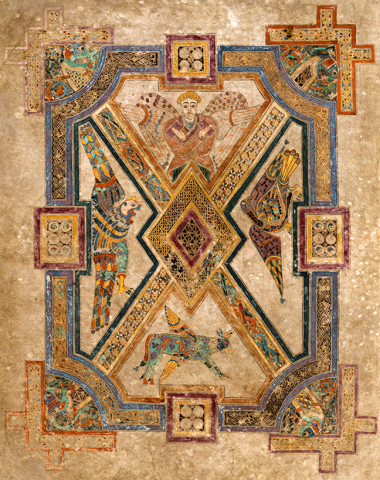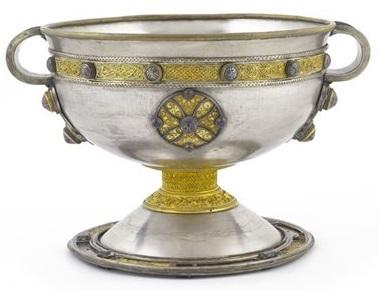[41] Dum autem perfīnīssent dēbitum vespertīnāle, coepit sānctus Brendānus cōnsīderāre quōmodo illa ecclēsia erat aedificāta. [42] Erat enim quadrāta, tam longitūdinis quam lātitūdinis, et habēbat septem lūmināria, idest tria ante altāre quod erat in mediō, et bīna ante alia duo altāria. [43] Erant enim altāria dē cristāllō quadrātō facta, et eōrum vāscula similiter dē cristāllō, idest patēnae et calicēs et urceolī et cētera vāsa quae pertinēbant ad cultum dīvīnum; [44] et sedīlia vīgintī quātuor per circuitum ecclēsiae. Locus ubi abbās sedēbat erat inter duōs chorōs.
[45] Incipiēbat enim ab illō ūna turma et in illum fīniēbat, et alia turma similiter. Nūllus ex utrāque parte ausus erat praesumere incohāre versum nisi praedictus abbās; nōn in monastēriō ūlla vōx aut ūllus strepitus. [46] Sī aliquod opus necesse fuisset alicui frātrī, ībat ante abbātem et genū flectēbat cōram illō, postulāns in corde suō quae necesse fīēbant. [47] Statim sānctus pater, acceptā tabulā et grafīō, per revēlātiōnem Deī scrībēbat, et dabat frātrī quī ab illō cōnsilium postulābat.
notes
The floor plan of the church is completely square. It has three altars, with three lamps on the central altar and two on each of the side altars. The altars and the utensils for Mass are made of crystal. The abbot sits in the middle, flanked by two choirs in a circular formation, of twelve monks each. There is no talking, and if a monk needs anything from the abbot the two communicate by a combination of telepathy (or gesture) and writing.
[41] dēbitum vespertīnāle: i.e., Vespers; dēbitum = officium.
[42] Erat enim quadrāta, tam longitūdinis quam lātitūdinis: appositional genitives (AG § 343.d), with quadrāta. A square church would be unusual; the description may reflect Revelation 21.16: “And the city lieth in a four-square, and the length thereof is as great as the breadth” (et civitas in quadro posita est, et longitudo eius tanta est quanta et latitudo).
et habēbat septem lūmināria: Revelation 4.5: “And from the throne proceeded lightnings and voices and thunderings, and there were seven lamps burning before the throne” (et septem lampades ardentes ante thronum). The "seven lamps" in Revelation are generally understood as the seven lamps on a single menorah; here they are imagined as separate candlesticks.
tria ante altāre quod erat in mediō, et bīna ante alia duo altāria: Irish churches of this date had only a single altar; here too the description is of a fantasy church. We are to imagine a main altar, in the middle at the east end of the church, and subsidiary altars to the two sides.
[43] patēnae, et calicēs, et urceolī: patens (for the bread) and chalices and cruets (for the wine).
[44] sedīlia vīgintī quātuor per circuitum: see on 12.30.
[45] ab illō ... et in illum: Each of the two choirs was in a circle, and each began with the abbot (ab illō) and ended with him (ad illum). The circles may have been concentric or (perhaps more likely) each one had at its center one of the two side altars.
Nūllus ... nisi praedictus abbās: The abbot sang all the verses of each psalm; the monks would have replied only with the Gloria Patri (“Glory be to the Father, and to the Son, and to the Holy Ghost; as it was in the beginning, is now, and ever shall be. Amen”). In modern practice the congregation typically responds to the celebrant by completing each individual verse of the psalm.
[46] Sī aliquod opus necesse fuisset alicui frātrī: “if any brother needed anything”; literally “if any brother had had some thing (aliquod opus) that was essential” (dative of possession); in CL the verb would probably be esset. Necesse is called an adverb in recent dictionaries, but it functions like a (usually) indeclinable adjective, always in the predicative position.
postulāns in corde suō: i.e., he didn’t actually speak.
[47] per revēlātiōnem Deī: “in accordance with a revelation from God.”
et dabat frātrī: = et dabat (opus) frātrī.
vocabulary
| perfiniō perfinīre perfinīvī (perfiniī) perfinītus | complete thoroughly 41 |
| vespertīnālis –e | of the evening; relating to Vespers |
| cōnsīderō cōnsīderāre cōnsīderāvī cōnsīderātus | to consider |
| ecclēsia –ae f. | congregation, church (LL) |
| aedificō aedificāre aedificāvī aedificātus | to build, erect, establish |
| quadrātus –a –um | squared, square 42 |
| longitūdō longitūdinis f. | length |
| lātitūdō lātitūdinis f. | breadth |
| septem; septimus –a –um | 7; 7th |
| lūmināre –is n. | lamp |
| altāre –is n. | altar |
| medium –iī n. | middle |
| bīnī –ae –a | 2 by 2 |
| altāre –is n. | altar |
| altāre –is n. | altar 43 |
| cristallum –ī n. | rock-crystal |
| quadrātus –a –um | squared, square |
| faciō facere fēcī factus | to do, make; to act, conduct oneself [OLD 28] |
| vasculum (vāsculum) –ī n. | small vessel or container; jar |
| similiter | similarly |
| cristallum –ī n. | rock-crystal |
| patēna –ae f. | paten used for the Mass (ML; CL pan, shallow dish) |
| calix –icis m. | cup, goblet, chalice |
| urceolus –ī m. | jug, cruet |
| vās –is or vāsum –ī n. |
vase |
| cultus cultūs m. | cultivation, civilization, dress, mode of life |
| dīvīnus –a –um | divine |
| sedīle –is n. | bench, chair 44 |
| vīgintī; vīcēsimus –a –um | 20; 20th |
| per | through; by means of [OLD 14] |
| circuitus –ūs m. | circuit, circle; outer edge, perimeter [OLD 5] |
| ecclēsia –ae f. | congregation, church (LL) |
| abbās –ātis m. | abbot, the head of a monastery |
| chorus –ī m. | a group of dancers and singers (CL); a church choir (ML) |
| turma turmae f. | troop (of cavalry); company, choir 45 |
| fīniō fīnīre fīnīvī fīnītus | to finish |
| turma turmae f. | troop (of cavalry); company, choir |
| similiter | similarly |
| praesūmō –ere –sūmpsī –sūmptus | to anticipate [OLD 3]; (ML) presume on the basis of |
| incohō –āre –āvī –ātum | to start work on, begin |
| versus versūs m. | line (of poetry) |
| praedīcō praedīcere praedīxī praedictus | to say beforehand; mention |
| abbās –ātis m. | abbot, the head of a monastery |
| monastērium –ī n. | a monastery |
| strepitus –ūs m. | noise; an uproar; din |
| abbās –ātis m. | abbot, the head of a monastery 46 |
| genū (genus) genūs n. | knee |
| flectō flectere flēxī flexus | to bend |
| corām | (adv. or prep. + abl.) face to face; in the presence of, in front of |
| postulō postulāre postulāvī postulātus | to demand |
| tabula tabulae f. | plank, (game) board; painting; writing tablet 47 |
| graphium –ī n. | stylus |
| per | through; by means of [OLD 14] |
| rēvēlātiō –ōnis f. | uncovering, revelation |
| postulō postulāre postulāvī postulātus | to demand |


